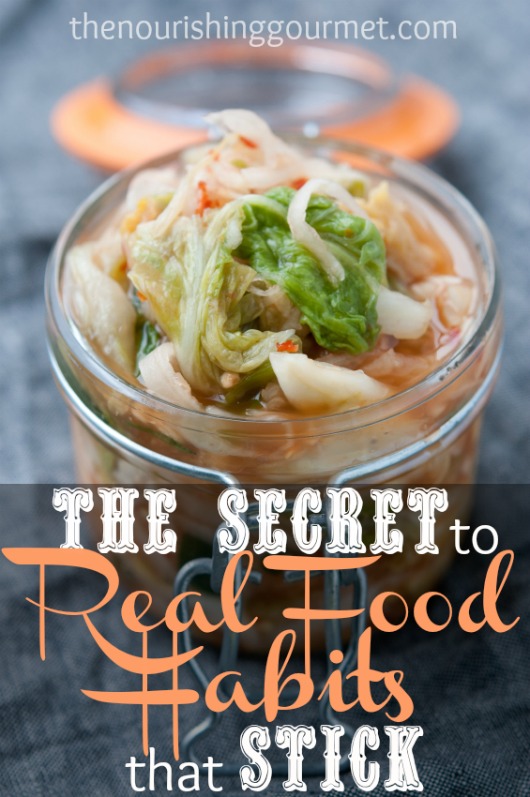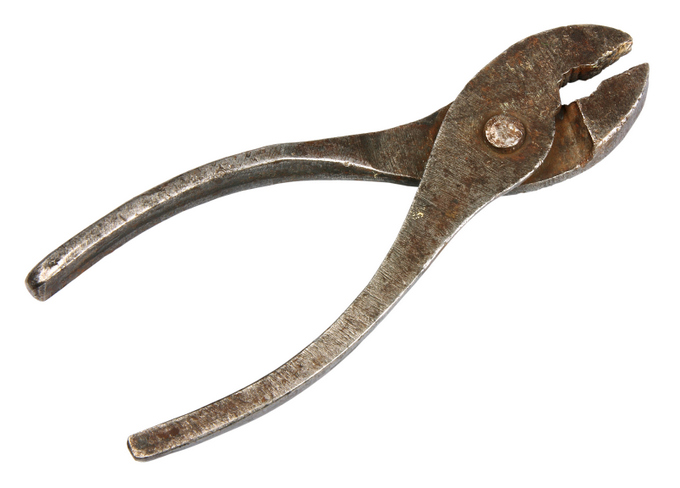By Alison Diven, Contributing Writer
You’re sold on real, whole foods prepared with love at home. You believe in bone broth and fermented foods and soaked grains—or at least you’re ready to give them a whirl. You can spout off all kinds of benefits to this “traditional” way of eating.
But knowing isn’t doing, and if you’re like me, doing is b.r.u.t.a.l., especially past the 2 week mark. My dirty little secret? It’s been—gasp—4 years since I last fermented vegetables. And I used to make tutorials about it!
(Bet you can guess what my nourishing food goal is right now.)
While the mind has unlimited storage capacity for good ideas, translating them into flesh-and-blood habits is, well, shall we say “humbling”?
Fortunately, with a big slice of humble pie, spectacular change is possible. I’ve revolutionized my nutrition and lifestyle over the past 8 years of my healing journey—with the results to prove it. And I’ve learned a few secrets of habit formation along the way.
The biggest secret for building a new habit? Make it easier.
Swallow your pride and stop trying to just muscle your way through. Instead, honor your limitations and give yourself every advantage. You probably need it.
Let’s take a look at three of my favorite strategies.
Try smarter, not just harder.
I’m all for hard work, but no one gets a gold star for wasted effort. Wherever you can, take as much of the thinking, willpower, and effort out of your new habit as possible.
Like this:
- Use existing cues for your new habit. Don’t create a whole new routine for yourself or choose a random time; instead, tack something new onto what you already do. You already brush your teeth every day, right? And put the kids to bed every night. And walk into the kitchen in the morning. Pick something like that and say, “The moment I put the baby down for his first nap, I will toss tomorrow’s grains in a bowl to soak.”
- Set the scene. Use visual cues for all they’re worth. Want to make yogurt first thing on Saturday mornings? Lay out all your equipment the night before. Not only will the sight remind you of your intentions the next day, you’ll already have made the decision and invested something in the project. All of this makes it easier to go forward, even when the couch calls.
- Write it down and post it. Even if you have an awesome memory. I can remember, but it saves valuable energy if I don’t have to. So write down your new habit and post it where it’ll remind you of your goal. Write out the steps. Even write why you’re doing it. Don’t make it complicated. Your sticky note could read,
Goal: to eat real-food lunches and snacks on the go
Why: to help us feel better and get healthier, and to save money
Cue: after dinner dishes are cleared
Routine:
1. Check tomorrow’s calendar for outings.
2. Pack nourishing protein, carbs, and fat into portable dishes.
3. Place front-and-center in fridge.
4. Set out lunch bags next to fridge.A second list of healthy lunch/snack options posted next to it would be the cherry on top. See how that would take even more thinking out of the equation?
Get real. Know your limits.
Change is hard. New habits are demanding. Let them be. It’s the key to making them easier.
Yes, yes, I want to be superwoman too. There’s just one problem. She’s a fantasy. So get real and really comfy with those nuisances called human limitations, like money, ability, time, and health. My mentor calls this “doing the MATH.” What are your account balances? They matter for your habit aspirations.
M=Money
Small income and you want to switch from coupon-able processed foods to whole foods? You’ll need to compensate with more time and energy. (And explore the Nourishing Gourmet for frugal ideas!) Large income? Use it to make this change easier. Get a few extra hours of childcare a week while you adjust to your new routines.
A=Ability
No prior training and few skills for menu planning? You’ll need more time and energy to learn the ropes—and maybe even some “wasted” money along the way. Allow all of that; it’s just tuition. Lots of latent skills? Put ‘em to work, so long as you don’t overspend in other accounts, like health.
T=Time
No time? Pick the one habit change that will make the biggest impact and go with that. Let the rest go for this season or scale back your commitments. Lots of time? Maybe it helps you overcome your limitations of money, ability, or health. Time was once my saving grace when I was poor in every other area.
H=Health
Poor health? Cut those habit goals down to size, girl! And get ready to spend more time than your friends do to make bone broth every week. Great health? Hurray! You have plenty of energy to build new skills and get a lot done fast. Just save some for your loved ones too.
You get the idea. Let reality ground your goals, and they’ll be easier and more sustainable. No more going into debt, of any kind.
Stock your toolbox.
You can have the cleverest strategies and perfect priorities, but without a well-stocked toolbox, you’ll struggle more than you need to. Here are a few tips for your real food toolbox:
- Get the best kitchen equipment you can afford. If every experience of making cultured vegetables or bone broth is negative—à la dull knives and slow cookers on the fritz—how long can your will power carry you? Honor your financial limitations, of course, but make quality tools a savings priority, scour Craigslist, and in the meantime find a friend whose equipment you can borrow or share.
- Enlist support through real-life friends, a Facebook group, or a local or online class. To help me return to fermenting vegetables, for example, I’ve invited a new friend to join me for a “kraut party.” Now I know I’ll follow through—and have fun too.
- Use a habits app. Thanks to this tip, for the first time ever I’m taking my fermented cod liver oil (so important for nursing and pre-conception) nearly every day for weeks. Wow! I love Way of Life for its simplicity, but Everest and Lift are other standout options.
- Fill your fun & comfort bucket. Make your longer kitchen tasks more enjoyable, and you make them 10 times easier. Can you savor a special treat while you make yogurt? I like GT Kombucha. Do you love music? Make a playlist or Pandora station. Feet or back hurt? Wear your most supportive shoes or get a pressure-relieving mat. The little things do matter.
- Use emotional acupressure techniques when you feel overwhelmed, discouraged, or frustrated. New habits always involve setbacks, and while I know in my head that’s okay, I often feel like it should be easier, or I should be able to do it perfectly. This tapping technique helps me dissipate the tension, and when I have some deeper heart issues going on (I don’t know about you, but I tend to blame God and others for my problems), I use the Tapas Acupressure Technique.
I’m feeling pretty inspired! Fermented vegetables are in. the. bag. for 2014. How about you? What’s your secret for real food habits that last?



